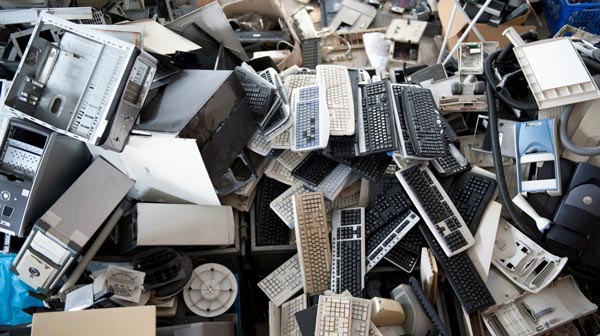Eco-Friendly Electronics Recycling Solutions: Count On the R2 Certification Standard
Wiki Article
Elevate Your E-Waste Administration With R2 Accreditation: a Detailed Overview
One secret method to raise e-waste monitoring methods is by acquiring R2 certification. By checking out the advantages and processes associated with R2 qualification, a deeper understanding of just how it can reinvent e-waste monitoring methods arises, shedding light on a path in the direction of sustainability and honest disposal techniques.Relevance of E-Waste Monitoring

When e-waste is not handled appropriately, these toxic materials can permeate right into the ecosystem, creating harm to wildlife and potentially going into the food chain, posing threats to human health and wellness. Moreover, the incorrect disposal of e-waste adds to air pollution and greenhouse gas exhausts, intensifying climate adjustment and environmental degradation.

Benefits of R2 Accreditation

To start with, R2 qualification boosts trustworthiness by showcasing a company's devotion to sustainable practices. It assures customers, companions, and stakeholders that the firm follows rigorous standards for e-waste administration - r2 certification. This credibility can cause boosted depend on and improved connections with clients who focus on ecological obligation
Secondly, R2 qualification aids reduce threats connected with incorrect e-waste disposal. By complying with the stringent guidelines established forth by the certification, organizations can minimize the possibility of information violations, environmental contamination, and lawful effects. This positive strategy safeguards the firm's track record and minimizes possible liabilities.
Last but not least, R2 certification shows a commitment to environmental stewardship - r2 certification. By sensibly taking care of digital waste via licensed processes, companies add to the preservation of resources, reduction of contamination, and promo of a round economy. This commitment not only benefits the setting however also aligns with advancing consumer assumptions for lasting organization methods
R2 Qualification Process Summary
Having established the benefits of R2 certification in promoting reputation, risk reduction, and ecological stewardship, it is important to now lay out the in-depth process associated with getting this accreditation. The R2 qualification process begins with a comprehensive review of the organization's functional policies and procedures to make sure compliance with the R2 criterion. This first assessment is vital in identifying any kind of gaps that need to be addressed prior to proceeding further.As soon as the company's practices straighten with the R2 conventional demands, an independent third-party auditor conducts an on-site audit to review the implementation and efficiency of these methods. This audit consists of a thorough review of paperwork, interviews with personnel, and physical inspections of facilities to verify compliance.
Complying with a successful audit, the organization obtains a qualification decision based upon the auditor's findings. If approved, the company is approved R2 qualification, demonstrating its dedication to liable e-waste monitoring. It is very important to note that keeping R2 certification requires continuous compliance with the standard's requirements and regular audits to make certain ongoing adherence to finest methods in e-waste recycling and disposal.
Key Criteria for R2 Compliance
A crucial facet of accomplishing R2 compliance is making certain that all digital waste (e-waste) handling centers satisfy strict environmental and safety criteria. To follow R2 demands, organizations should abide by crucial standards that focus on accountable e-waste administration techniques. These standards include applying a recorded ecological, wellness, and safety administration system, guaranteeing the secure browse around here handling of data-containing tools, and carrying out detailed downstream due persistance to track the last location of e-waste materials.In addition, R2 conformity demands the proper testing, refurbishment, and recycling of digital devices to expand its valuable life and decrease ecological impact. Facilities seeking R2 qualification must also focus on worker health and wellness by giving required training, individual safety equipment, and a risk-free workplace. Furthermore, preserving comprehensive records of e-waste processing tasks and routinely undergoing audits by approved certifying bodies are vital parts of demonstrating ongoing compliance with R2 standards.
Effects of Lasting E-Waste Practices
The execution of sustainable e-waste techniques according basics to R2 compliance not only makes sure ecological and safety and security criteria are met yet additionally significantly influences the general lifecycle of electronic items. By adhering to R2 standards, digital waste administration procedures come to be extra effective, lowering the ecological footprint of digital items. Sustainable e-waste methods promote the proper disposal of electronic parts, ensuring that harmful products are dealt with properly and do not finish up contaminating the environment.In addition, welcoming lasting e-waste methods advertises the circular economic climate by helping Read More Here with the recovery and reuse of useful products from electronic products. This not just saves valuable resources however additionally reduces the requirement for raw product removal, decreasing the ecological effect of digital production. In addition, sustainable e-waste practices can add to task production in the recycling and repair fields, cultivating economic development while advertising ecological duty. Overall, the fostering of sustainable e-waste methods under R2 qualification serves as a crucial step towards achieving a more environmentally sustainable electronic devices market.
Verdict
To conclude, executing appropriate e-waste administration practices is essential for environmental sustainability and resource preservation. R2 qualification plays a crucial role in guaranteeing responsible handling and disposal of electronic waste. By sticking to the rigorous requirements stated by R2 criteria, companies can not just reduce their ecological impact yet additionally add to a more lasting future for generations ahead.One secret method to elevate e-waste administration methods is by attaining R2 certification. By exploring the advantages and procedures connected with R2 accreditation, a much deeper understanding of just how it can transform e-waste management strategies emerges, losing light on a course towards sustainability and ethical disposal practices.
The R2 accreditation process starts with a thorough review of the company's functional plans and procedures to ensure conformity with the R2 requirement. If authorized, the company is provided R2 certification, showing its commitment to liable e-waste administration. Generally, the adoption of sustainable e-waste practices under R2 qualification serves as an important action towards accomplishing a much more eco lasting electronic devices sector.
Report this wiki page